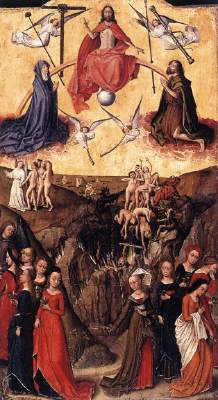Thoughts on Today’s Lessons for Nov. 9, 2014

The Wise and Foolish Virgins. Unknown master, Flemish, oil on oak panel, c. 1480. Staatliche Museen, Berlin.
This week’s readings are challenging. They make us work to discern how these selections from Scripture might guide our lives. Here we see the people renewing their covenant with God as they enter the promised land. They recall their path out of slavery in Egypt, and they promise to be faithful to God, placing no other gods before God. But what do you think about the people’s gratitude that God drove out the Amorites who lived in the land to make a home for Israel? Does this troubling verse make you think about our treatment of the American Indians or Israel’s modern relationship with Palestine? How do you suppose God might expect us to interact with the world’s nations in modern times?
First Reading (Track 2): Amos 5:18-24
This week’s readings are challenging. They make us work to discern how these selections from Scripture might guide our lives. The prophet Amos begins with a frightening question: What if God’s judgement does not go well for us? What if God rejects our prayers and turns away? What if we run from a lion only to be eaten by a bear!? But there is hope. As the verses that surround this reading assure us, when we seek good and not evil – when our justice and righteousness flow like mighty waters – then God will be with us.
Psalm: Psalm 78:1-7
We sing only the first seven verses of a very long Psalm today. The Psalm in full goes on to recount the sins and failures of the people, a sorry narrative that ends happily, nevertheless, with the love and skillful guidance of God. Today, however, we hear good news of God’s gifts to humankind, God’s words and teachings that we should pass down to our children and their children’s children.
Psalm (Track 2): Psalm 70
Today’s Psalm, too, begins on a dark note. The Psalmist is beset by enemies who would not only kill him but enjoy his misfortune and gloat over his losses. The Psalmist wants justice: Let those enemies suffer the shame and disgrace that they seek for him! Can the poor and needy who seek God count on God’s protection? God is great. But please, God, the Psalmist begs: Hurry, God, please. Don’t make us wait!
Second Reading: 1 Thessalonians 4:13-18
Hey! Is this about the Rapture? Well, not exactly. Yes, some Christians do read this passage as a literal prediction of dead and living believers all being lifted up through the clouds to meet Jesus at the last trump. But most bible scholars find a simpler explanation: Early Christians expected that Jesus would come back and establish God’s kingdom very soon, while they still lived. But now it was a generation later, and some people were dying! Would they miss Jesus? No, says Paul. Be encouraged: All will be saved.
Gospel: Matthew 25:1-13
When Matthew tells us that Jesus said, “The kingdom of heaven will be like this,” we can expect the following parable to challenge our expectations. Sure enough, this story is just as unsettling as the other “kingdom” parables we’ve heard recently: the outcast who had no wedding garment; the murderous vineyard workers; and the workers who were all paid the same. Here, the bridesmaids who didn’t plan ahead were locked out of the banquet, dismissed by the bridegroom, even though he was late, himself! Is Jesus telling us that the kingdom of heaven is unfair? No. Rather, the parable offers simple wisdom: Jesus, the bridegroom, is coming: Be ready!
